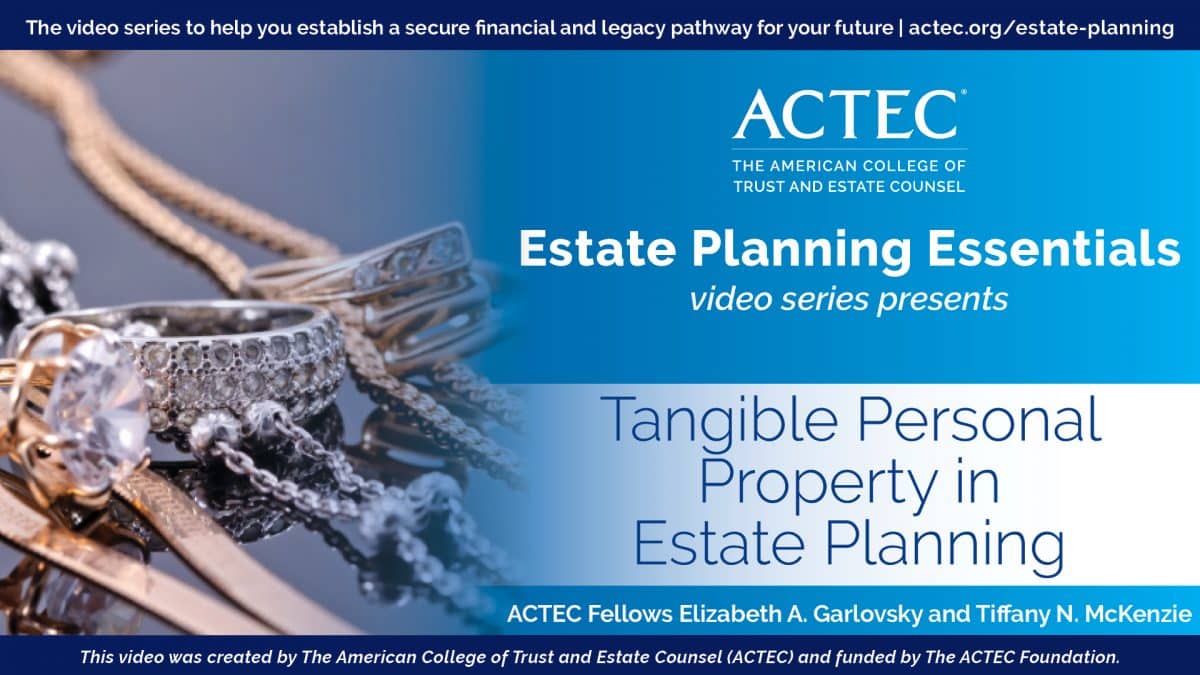An overview of the various ways assets, such as a home, can be titled to reflect the legal ownership of the property. There are a number of ways real estate can be titled: joint tenancy, tenancy in common, tenants by entirety, sole ownership, and community property.
ACTEC Fellows Stephanie Perry and Akane R. Suzuki explain the ins and outs of each option.
Transcript
Hi, I’m Akane Suzuki. I’m an ACTEC Fellow from Seattle, Washington and here with me today is Stephanie Perry from Bethesda, Maryland, also an ACTEC Fellow. Stephanie, clients often ask me about how they should title assets. What are some of the common ways of titling property?
Stephanie Perry: Property can be titled in various ways. Common ways to title property include Individual or Sole Ownership, where the property is titled in the name of an individual person. There are also forms of Joint Ownership, including Tenants in Common (TIC), Joint Tenants with Right of Survivorship (JTWROS), and Tenants by the Entirety (TBE). Tenancy in Common joint ownership is between two or more people. With this form of ownership, upon the death of a joint owner, the deceased owner’s interest in the property will pass as part of the deceased owner’s estate. Joint Tenancy with Right of Survivorship is also joint ownership between two or more people; but with this form of ownership, upon the death of a joint owner, his or her interest in the property passes automatically to the surviving joint owner or owners by operation of law. For example, if a married couple owns property as Joint Tenants with Right of Survivorship, upon the death of one spouse, the surviving spouse automatically becomes the owner of 100 percent of the property. Tenants by the Entirety ownership works the same way as Joint Tenancy with Right of Survivorship, but this form of ownership is available only to spouses.
Akane Suzuki: Thank you, Stephanie. That’s very helpful. In Washington State, where I practice, we have Community Property, and in Community Property states, we have another form of joint ownership for married couples called Community Property. And holding assets as community property by itself does not create survivorship rights like Joint Tenancy does, although it is possible to designate it that way. On the other hand, Tenants by the Entirety is not a concept that we have in Community Property states. So, I’m not as familiar with that concept. So, if you could explain it a little bit more. Specifically, are there any benefits for a married couple to own it that way?
Stephanie Perry: There is a benefit in owning property as Tenants by the Entirety. Owning property in this way provides creditor protection for the property. Tenants by the Entirety property is not subject to the claims of the creditors of just one spouse, although, it is subject to the claims of a creditor of both spouses. This creditor protection can be very valuable to a married couple.
Akane Suzuki: Clients also often ask about creating a Revocable Living Trust and titling assets that way. Can you tell us a little bit about that option?
Stephanie Perry: Sure. A Revocable Living Trust is a trust that a client creates during her lifetime, and the client transfers title to her property to that trust. Two of the most common reasons to create a revocable trust are for incapacity planning and for probate avoidance. With respect to incapacity planning, I often advise clients that it may make sense to consider creating a revocable trust when they get to a point in life where they may be less able to manage their own financial affairs. In this instance, a revocable trust simplifies incapacity planning because it makes it very seamless for the successor trustee to step in and start managing things on behalf of the client. With respect to probate avoidance, in many jurisdictions, the probate process is quite straightforward. So, probate avoidance would not be a compelling reason to create a revocable trust. In other jurisdictions, probate may be especially difficult or time-consuming. In those jurisdictions, titling property in a revocable trust is likely a good option that should be discussed with an attorney. Also, if a client owns real property in multiple jurisdictions, a revocable trust is a good idea because it avoids the necessity of having to go through probate in more than one jurisdiction.
Akane Suzuki: I see. Very helpful. Now, what about inherited property?
Stephanie Perry: Great question. In most jurisdictions, but not all, to the extent that you own inherited property, and you keep it separate from and don’t commingle it with marital property, it’s not subject to division in the event of divorce. So, it’s very important for a client who owns inherited property that intends to maintain the separate character of that property to title it in a way so that it is kept separate from and not commingled with marital property.
Akane Suzuki: I see, and it’s the same in community property states too. Thank you very much, Stephanie. This was very helpful.
Stephanie Perry: It’s my pleasure. Thank you.
Featured Video
Tangible Personal Property in Estate Planning
Experts explain why you’ll want to add provisions regarding tangible personal property, such as furniture, vehicles, electronics, and jewelry, to your will or trust.
ACTEC Estate Planning Essentials

ACTEC Fellows provide answers to frequently asked trust and estate planning questions in this video series.



